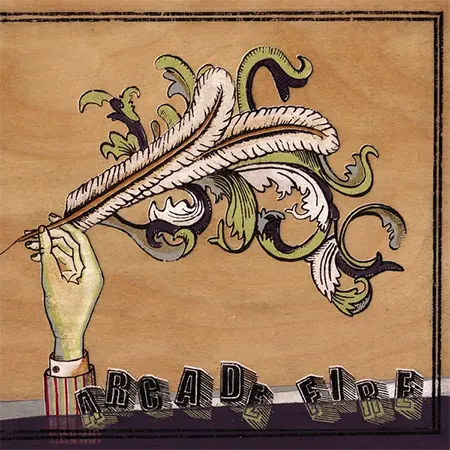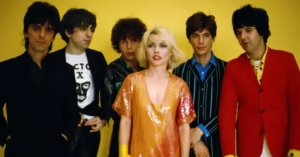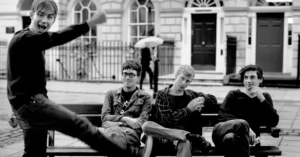Arcade Fire: The Epic Visionaries of Indie Rock
Since the release of their debut album Funeral in 2004, Arcade Fire has stood as one of the most ambitious and emotionally resonant bands in alternative and indie rock. Known for their sweeping arrangements, multi-instrumentalist lineup, and deeply personal lyrical themes, the Montreal-based collective has carved out a singular space in modern music. With a sound that balances raw emotional intensity and grandiose musical scope, Arcade Fire has consistently pushed the boundaries of what indie rock can be.
Arcade Fire. Origins and Formation
Arcade Fire was formed in 2001 in Montreal by husband-and-wife duo Win Butler and Régine Chassagne. The original lineup expanded to include Richard Reed Parry, William Butler (Win’s brother), Tim Kingsbury, Sarah Neufeld, and Jeremy Gara. From the beginning, the group was defined by its collaborative nature and multi-instrumental approach, with members often switching between instruments during live performances.
Win Butler, originally from Texas, moved to Montreal to study at McGill University. There he met Chassagne, who was studying jazz at Concordia University. Their creative chemistry laid the foundation for what would become one of the most acclaimed bands of the 21st century.
Funeral (2004): A Monumental Debut
Arcade Fire’s first full-length album, Funeral, was a revelation. Named after a series of personal losses experienced by the band members during its recording, the album channeled grief and longing into cathartic anthems. Songs like “Neighborhood #1 (Tunnels),” “Rebellion (Lies),” and “Wake Up” captured youthful hope, existential yearning, and communal emotion in a way few bands had done before.
Critics hailed Funeral as a masterpiece, and it quickly gained a cult following. The album topped many end-of-year lists and has since been recognized as one of the greatest albums of the 2000s. Its success helped redefine indie rock, proving that it could be orchestral, ambitious, and emotionally resonant.
Neon Bible (2007): Darker and Grandiose
After the emotional intimacy of Funeral, Neon Bible took a darker turn. Inspired by themes of media saturation, religious fundamentalism, and American politics, the album was recorded in a converted church and employed pipe organs, string sections, and choirs to achieve a massive, haunting sound.
Tracks like “Intervention,” “Keep the Car Running,” and “No Cars Go” built on the emotional urgency of their debut but with a more apocalyptic tone. While slightly less universally praised than Funeral, Neon Bible cemented Arcade Fire’s place as serious artists with something vital to say.
The Suburbs (2010): A Masterpiece of Nostalgia
Arcade Fire reached the pinnacle of their critical and commercial success with The Suburbs. Drawing on Win and William Butler’s experiences growing up in suburban Houston, the album explored themes of memory, alienation, conformity, and the passage of time. Musically, it expanded the band’s palette to include new wave, synth-pop, punk, and folk influences.
Songs like “Ready to Start,” “Sprawl II (Mountains Beyond Mountains),” and the title track showcased their talent for balancing personal storytelling with social commentary. The Suburbs won the Grammy Award for Album of the Year in 2011, surprising many and validating the indie scene’s influence on mainstream music.
Reflektor (2013): A Danceable Departure
Produced by James Murphy of LCD Soundsystem, Reflektor marked a stylistic shift for the band. Inspired by Haitian rara music, disco, and art rock, the double album was sprawling and experimental. The record was deeply influenced by Régine Chassagne’s Haitian heritage and the couple’s travels in the country.
The album’s title track, featuring a cameo from David Bowie, became a standout hit. Other songs like “Afterlife,” “We Exist,” and “Here Comes the Night Time” demonstrated the band’s willingness to evolve sonically and embrace dance rhythms and electronic textures. Reflektor was divisive among fans and critics but demonstrated Arcade Fire’s fearlessness and ambition.
Everything Now (2017): The Irony of Excess
With Everything Now, Arcade Fire leaned heavily into satire, critiquing consumer culture and digital overload. Produced with help from Thomas Bangalter (Daft Punk) and Steve Mackey (Pulp), the album embraced glossy production and ABBA-style disco influences.
The title track was catchy and anthemic, but some critics felt the album’s themes were undermined by its own excesses. Despite this, Everything Now still featured moments of poignancy and brilliance, particularly in tracks like “Creature Comfort” and “Put Your Money on Me.” It was a polarizing record that reflected the anxieties of its time.
WE (2022): Return to Form
After a five-year hiatus, Arcade Fire returned with WE, a more introspective and concise album co-produced by Nigel Godrich (Radiohead). Split into two thematic halves (“I” and “WE”), the album revisits themes of isolation, reconnection, and collective healing.
Songs like “The Lightning I, II,” “Unconditional I (Lookout Kid),” and “End of the Empire IV” were hailed as a return to emotional depth and musical clarity. Though not as universally praised as their early work, WE was seen as a mature and heartfelt statement in a time of global uncertainty.
Arcade Fire. Legacy and Influence
Arcade Fire’s impact on indie rock and alternative music is immense. They helped usher in a new era where indie bands could headline festivals, win Grammys, and reach broad audiences without compromising artistic vision. Their live shows, often featuring 10 or more musicians on stage, are theatrical, communal experiences that bring their anthemic songs to life with energy and sincerity.
Many bands, from Florence + the Machine to The National and LCD Soundsystem, have acknowledged Arcade Fire’s influence. Their ability to blend emotional urgency with orchestral grandeur and post-punk energy remains unmatched.
Arcade Fire. Controversy and Moving Forward
In 2022, shortly after the release of WE, lead singer Win Butler was accused of sexual misconduct by multiple individuals. Butler denied the allegations, but the controversy cast a shadow over the album’s release and the band’s tour. While some fans distanced themselves, others hoped for accountability and healing.
As of now, the band’s future remains uncertain, but their legacy in alternative rock is secure. Whether or not they continue, Arcade Fire’s discography stands as one of the most compelling bodies of work in 21st-century music.
Arcade Fire. Conclusion
Arcade Fire has always aimed for more than catchy hooks and radio play. Their albums explore deep emotional terrain and existential questions, often wrapped in lush, dynamic soundscapes. From Funeral’s raw grief to WE’s call for unity, they have never stopped searching for meaning in a chaotic world. In doing so, they’ve given their audience not only unforgettable music but a soundtrack to navigate life’s complexities.





